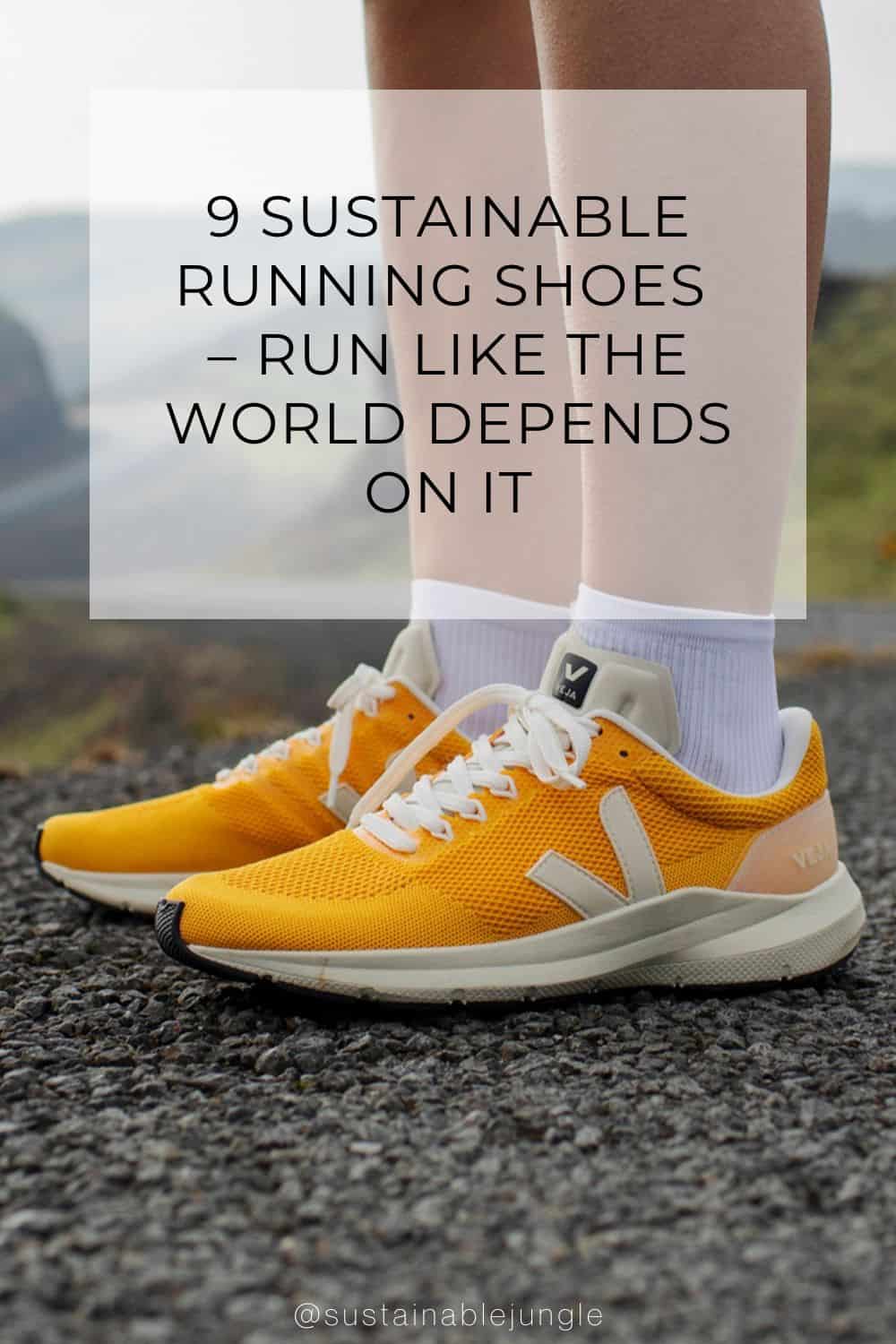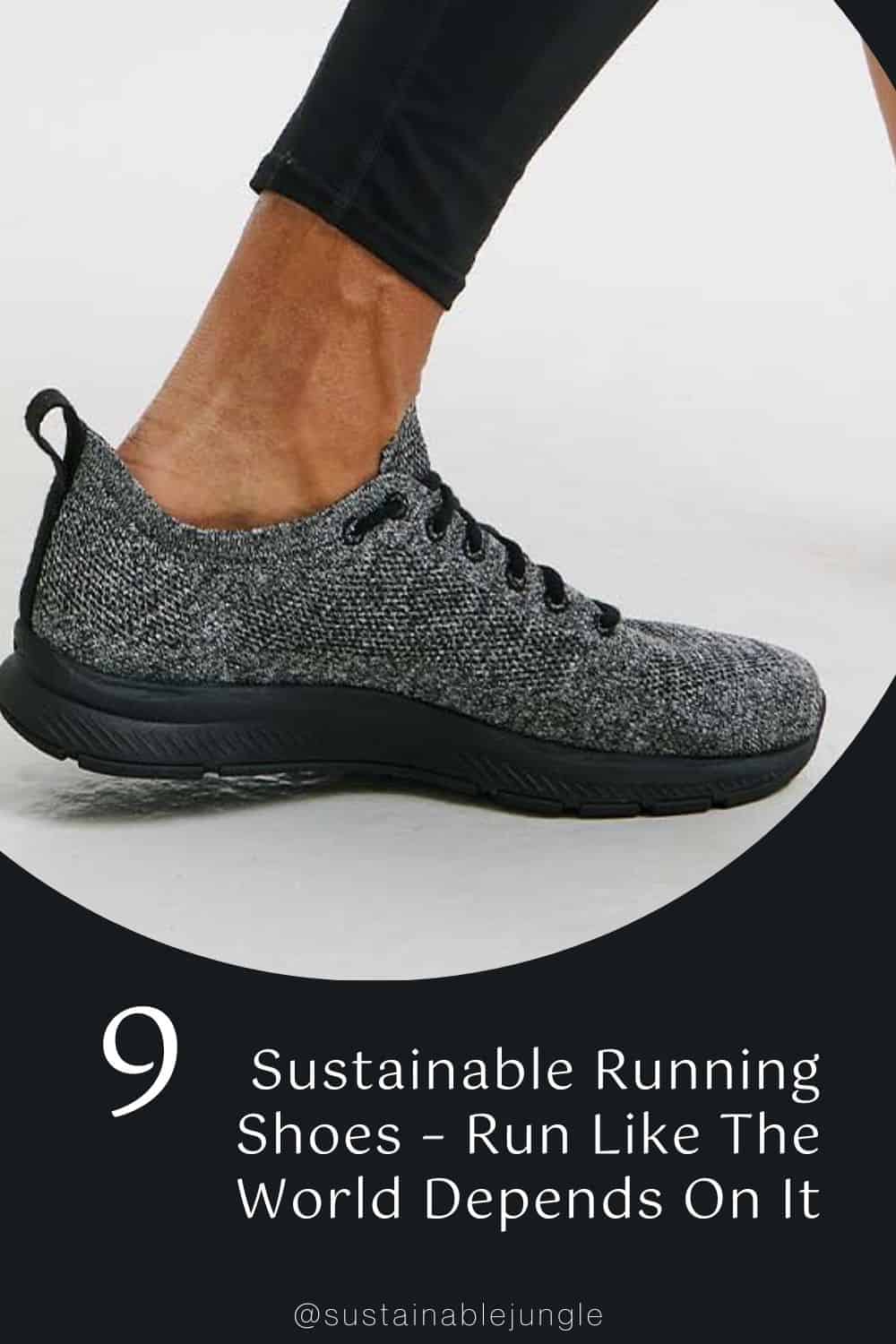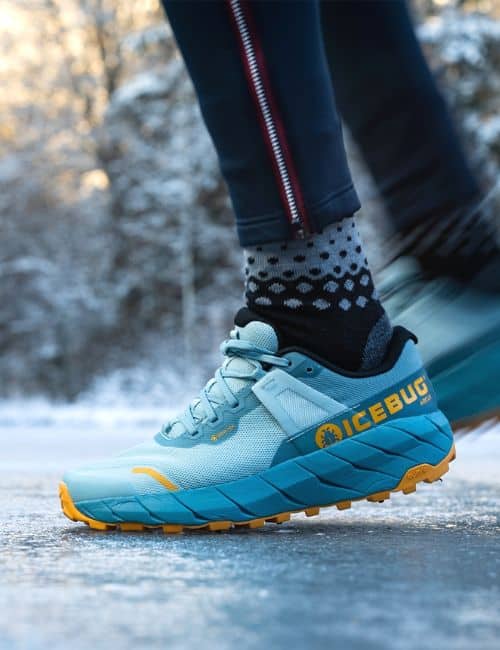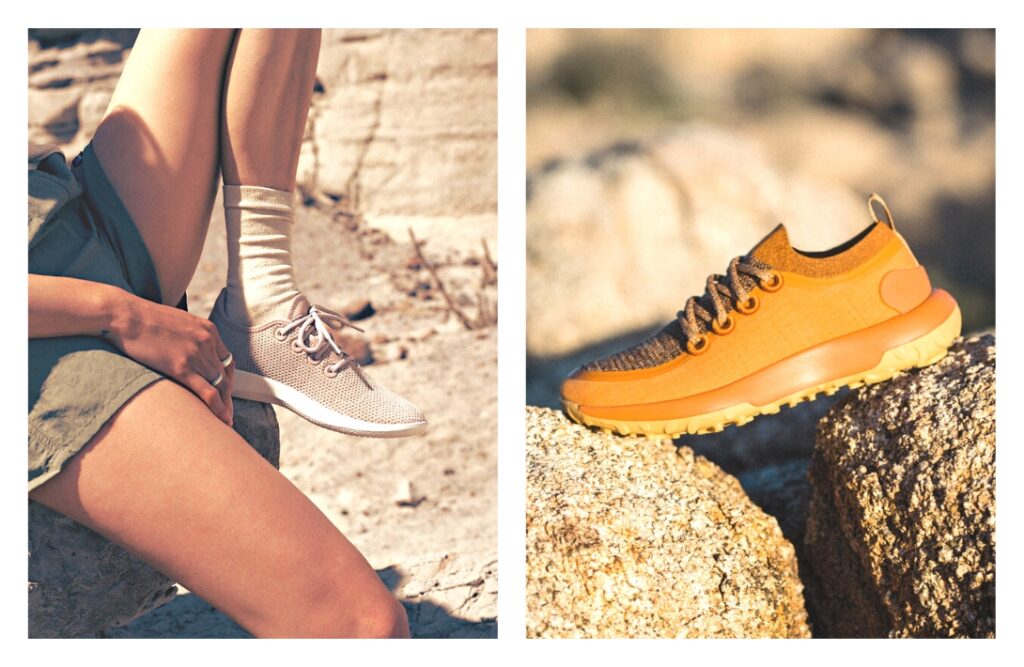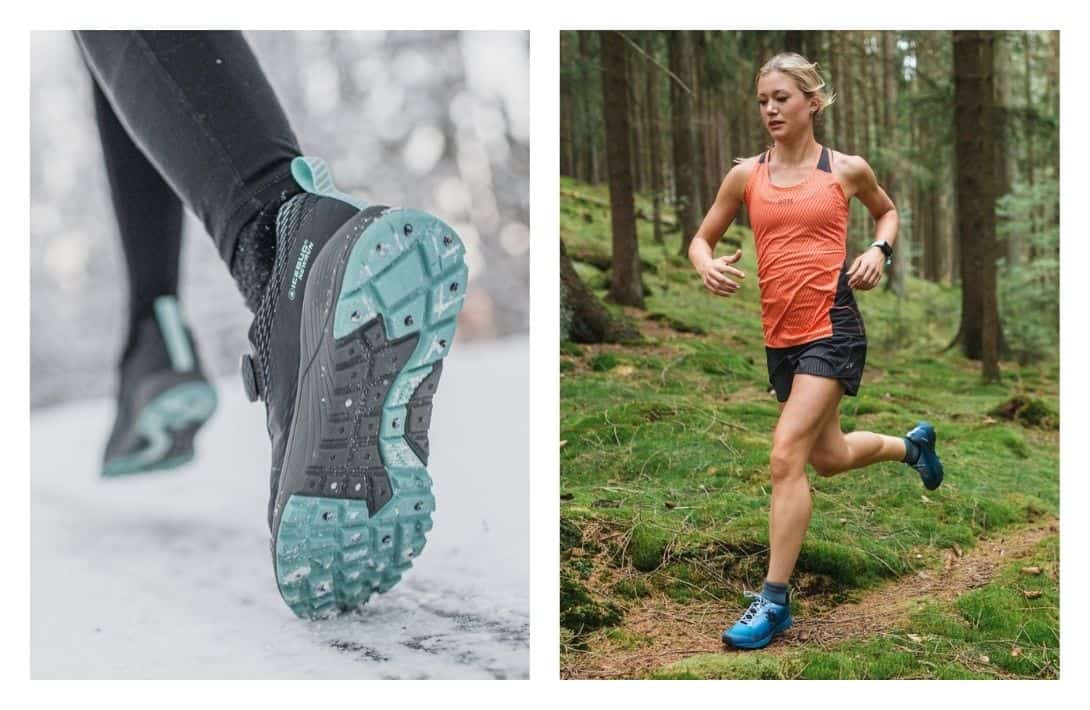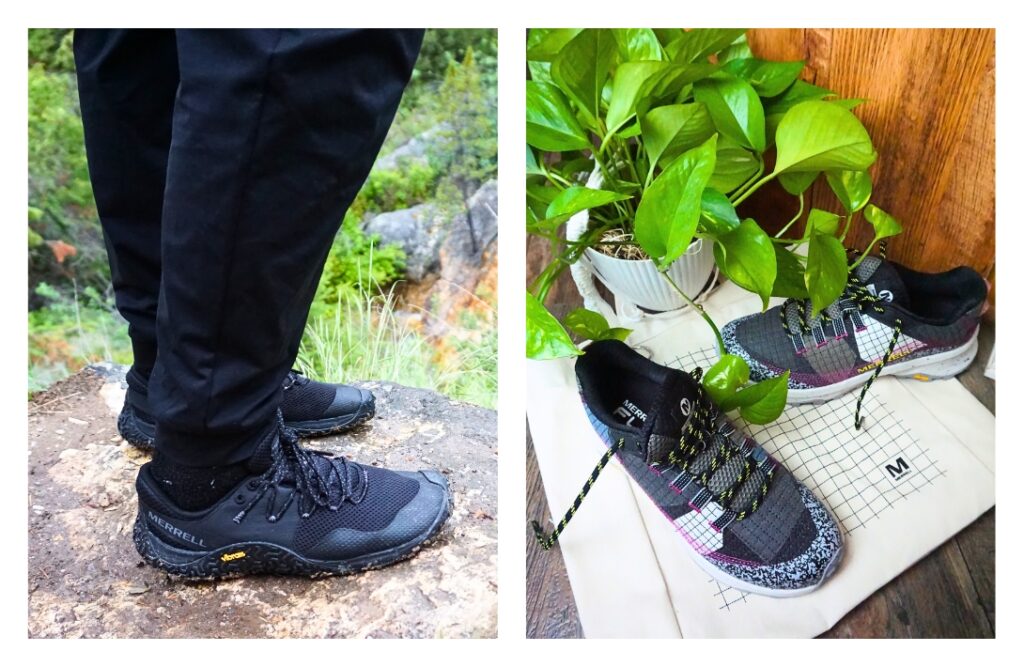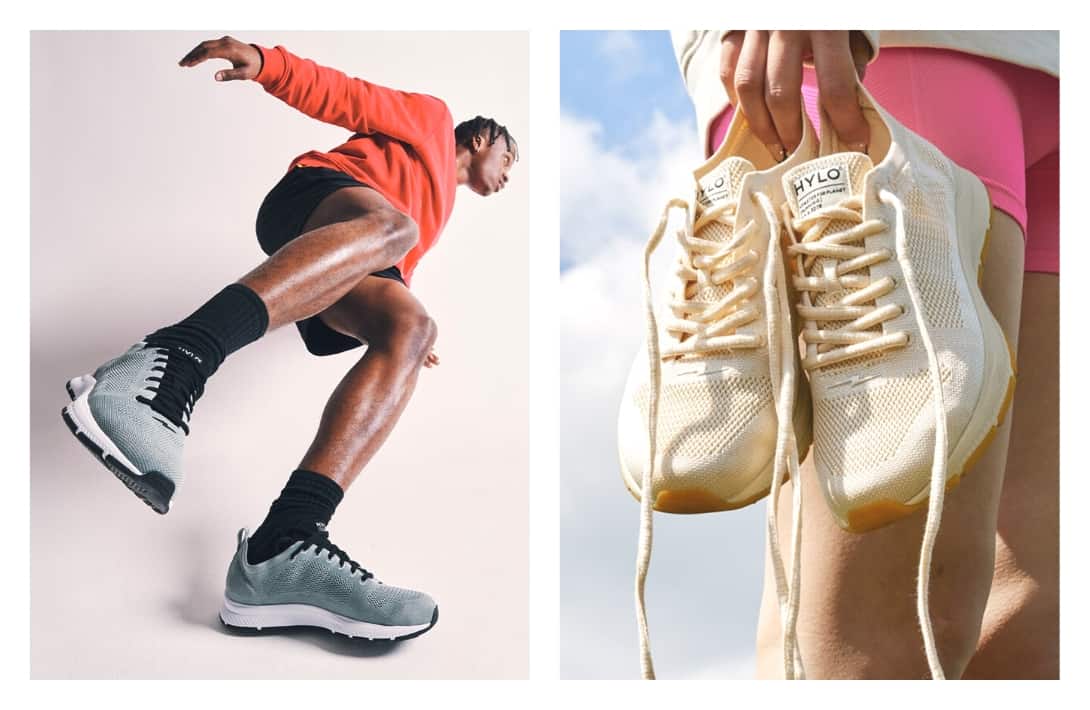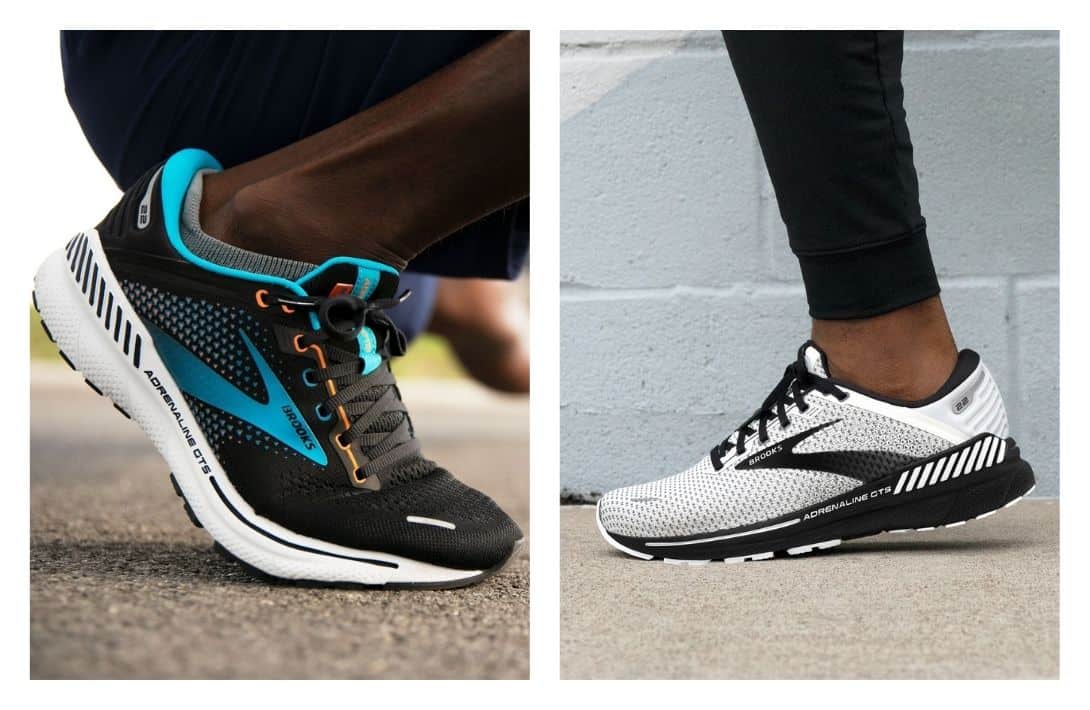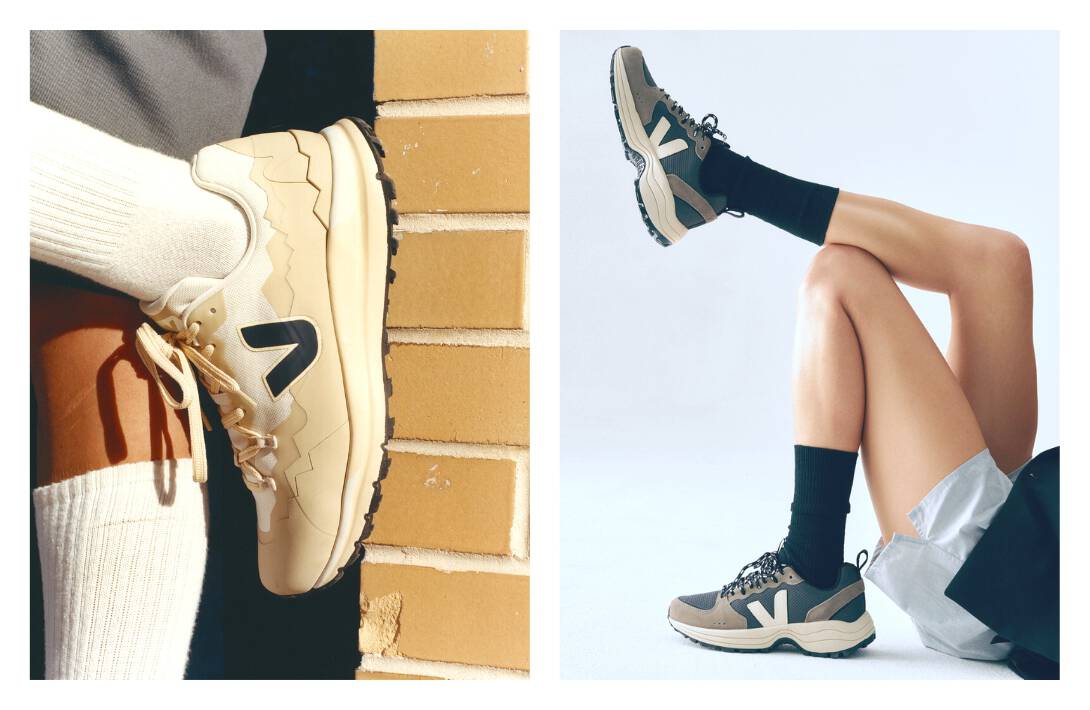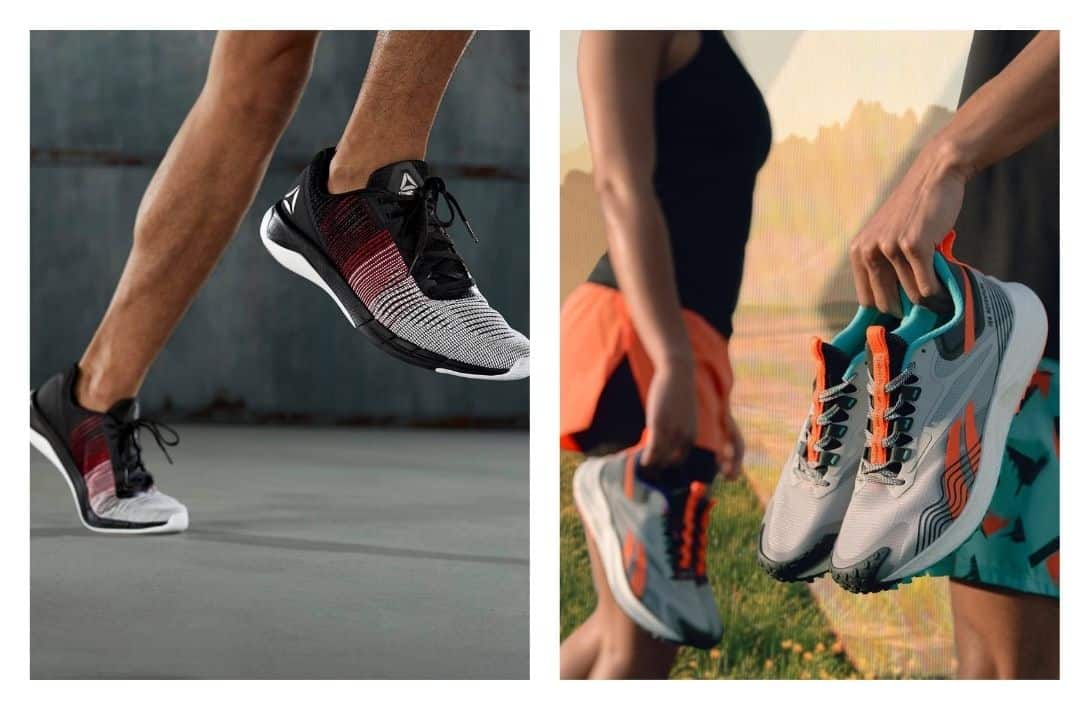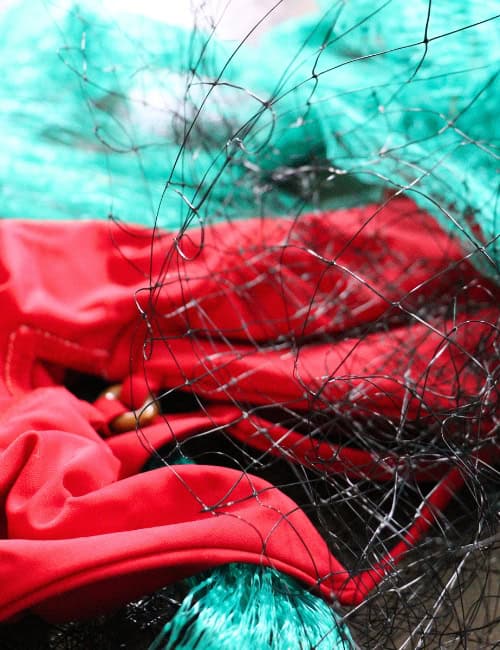9 Sustainable Running Shoes – Run Like The World Depends On It
How can we work on our 5K PR without sending our planet straight to the finish line?
It’s a feat (or feet, rather) and likely one that won’t be solved as fast as you can run around the block.
The footwear industry as a whole has some pretty dirty practices en-tread-ed in it, hence our recent ethical shoe brand kick into eco-friendly sneakers.
Now we’re shifting focus and covering some serious ground on sustainable running shoes.
Everything we recommend to you on Sustainable Jungle is independently researched and we ask all brands to confirm their claims. To avoid waste, we test products on an as needed basis. This post contains affiliate links. If you buy something through our links, we may earn a small commission. Learn more about why we do this here.
Sustainable & Recycled Running Shoes Setting A Planet-Friendly Pace
Carbon Neutral Allbirds also make some of the best ethical running shoes out of mostly biobased materials.
“Climate positive” footwear brand Icebug, takes care of your winter running, slippery conditions included with their running shoes made from recycled plastic.
Get a runner’s high on circular footwear from On. Their Cyclon line of sustainable running shoes are 100% recyclable.
If you’re interested in the fast track, sprint to the end to see how we found this track team of sustainable running shoe brands.
The Full List Of The Best Eco-Friendly Running Shoe Brands
- Allbirds | Visit Store
- On | Visit Store
- IceBug | Visit Store
- Merrell | Visit Store
- hylo Athletics | Visit Store
- Brooks | Visit Store
- Vivobarefoot | Visit Store
- VEJA | Visit Store
- Reebok | Visit Store
1. Allbirds
About Allbirds
Price Range: $135–$170
Your feet will feel like flying when you lace up a pair of eco running shoes from Allbirds.
For everyday use, the Tree Dasher 2 features a one-piece upper for seam-free comfort, a lightly padded heel, and a flexible cushioned insole. We found this shoe a pretty reliable neutral fit for short to moderate distances.
If you’re looking for sustainable trail running shoes, the Trail Runners SWT feature multi-directional 4mm lugs for increased grip on multiple terrains.
Allbirds’ Ethical & Sustainability Practices
We’ve done a deep dive on Allbirds’ sustainability but for the sake of brevity, here’s the summary.
Materials:
For uppers, they use merino wool, FSC-certified TENCEL™ lyocell, or a blend of both.
The SwiftFoam™ midsole features 48% bio-based castor bean oil, and the SweetFoam® midsole is made with sugarcane-based EVA.
Outsoles are made from FSC-certified natural rubber. Other sustainable materials include bio-based TPU, bio-based nylon, and recycled polyester.
Note that none of the current styles are vegan as even the Tree Dasher contains a ZQ-certified regenerative merino wool heel lining.
Supply chain & labor practices:
This Certified B Corp’s ethical running shoe factoryn in Hai Phong, Vietnam is part of the Better Work program and suppliers must adhere to their Code of Conduct, which prohibits forced labor, child labor, unreasonable working hours, and more.
Carbon commitments & green practices:
Aside from being carbon-neutral by offsetting 100% of emissions, their Flight Plan details ways in which they plan on reducing emissions—like having all factories operate using 100% renewable energy by 2025.
In 2022, they achieved a 12% emissions reduction.
Each pair is labeled with its carbon footprint and shipped in an all-in-one bag, box, and mailer made from 90% post-consumer recycled cardboard.
They promote circulation by selling used shoes through ReRun.
Community & charitable giving:
Through Soles4Souls, lightly used and returned shoes are donated.
2. On
About On
Price Range: $135–$170 or $30/month
On is on point when it comes to making performance-forward running shoes.
While we love all their partially recycled running shoes, the Cloudneo runners are leading the pack.
Unlike the rest of their styles for purchase, you rent these and return them at the end of their usability (about six months) for a fresh pair—Cyclon indeed!
On’s Ethical & Sustainability Practices
Materials:
The undyed Cloudneo shoes feature uppers made of PA11, a bio-based plastic that’s engineered from castor beans, and Pebax® bottoms, another castor oil-derived bio plastic.
The rest of their line features varying percentages of recycled materials, such as knit uppers 90–95% recycled synthetics. Total recycled content currently is about 35–40%.
They’re working on replacing traditional EVA foam with CleanCloud™, a material developed from captured carbon emissions.
Supply chain & labor practices:
On’s recycled shoes are made in Vietnam, in compliance with ILO and ETI standards.
Carbon commitments & green practices:
Can running shoes be recycled?
On’s Cloudneos can. These shoes are a fully zero waste product made of 100% recyclable materials. Send them back in the bag your new shoes arrive in and On takes care of rest.
3. IceBug
About Icebug
Price Range: $130–$280
Running in icy conditions?
Swedish brand Icebug is on a mission to make sustainable traction footwear and inspire more people to get outdoors.
Specializing in recycled plastic running shoes for winter conditions, the Certified B Corp offers plenty of shoes for all of your outdoor adventures, including those with GORE-TEX® (GTX) waterproof membranes.
Icebug’s Ethical & Sustainability Practices
Materials:
Uppers are made from bluesign® and 100% GRS-certified recycled PET polyester, the midsoles contain 20% BLOOM® foam, and outsoles from FSC-certified natural rubber.
The GORE-TEX® lining used for some models is bluesign®-approved and OEKO-TEX-certified.
You’ll also find recycled fishing nets and recycled polyethylene.
Supply chain & labor practices:
If you want an eco-friendly running shoe not made in China, Icebug’s are made in Vietnam in factories that are regularly audited.
This Fair Wear Foundation member’s Follow Our Foot Footprints initiative makes it easy for customers to trace the journey of each pair of shoes. Scan the QR code in the tongue or shoebox to reveal manufacturer info and sustainability stats.
Carbon commitments & green practices:
This recycled shoe brand was the first in footwear to become climate positive by offsetting 200% of emissions—including all historical emissions since starting over two decades ago.
They’re committed to halving emissions by 2030 and always use sea freight over air freight.
Each product description highlights the CO2 footprint and percentage of recycled and bio-based materials present.
Community & charitable giving:
Icebug is a member of 1% for the Planet. Recipients include Protect Our Winters and Naturarvet.
4. Merrell
About Merrell
Price Range: $90–$150
Merrell’s running shoes and sustainable hiking shoes are made for years of puddle splashing, hill ascending, and hundreds of miles of rough terrain.
While not all are the most sustainable running shoes, we’ve tested three models that are and can’t speak highly enough about how lightweight and comfortable each is.
We peronallly recommend the Trail Glove for trail running and the more traditionally supportive Moab Flight for road running where greater impact absorption is needed.
Merrell’s Ethical & Sustainability Practices
Materials:
The Trail Glove shoes are made with 100% recycled materials for the uppers, laces, lining, and footbed cover, with a 30% recycled EVA foam midsole and 30% recycled rubber Vibram® outsole.
The Moab Flight features a 70% recycled upper, a 50% recycled footbed cover, 100% recycled laces, and 30% recycled Vibram® outsole.
The Scrap collection isn’t running focused, but it is sustainability focused, with each product made of patch of a patchwork of scraps from their other shoe manufacturing.
Supply chain & labor practices:
Merrell works with global partners committed to humane, safe, and ethical working conditions.
Suppliers must comply with parent company Wolverine Worldwide’s Code of Conduct.
Carbon commitments & green practices:
Merrell is a member of the Sustainable Apparel Coalition aiming to reduce plastic packaging and shoe samples, while increasing use recycled materials to 100%.
The brand’s recycle and resell program “ReTread” encourages customers to send back their old pair for rehoming.
Inclusivity:
Merrell’s The Trail Ahead aims to make the outdoors more welcoming and inclusive by partnering with Zappos Adaptive and Unlikely Hikers.
Community & charitable giving:
Merrell is a member of The Conservation Alliance and makes regular financial contributions.
5. Hylo Athletics
About hylo Athletics
Price Range: $135–$170
Carbon negative—you don’t hear that too often in the world of shoes.
More than a brand, hylo Athletics is a “community of champions of tomorrow”.
Their ethical vegan running shoes are extremely lightweight (for tired legs and a tired planet) and designed to be recycled.
hylo Athletics’ Ethical & Sustainability Practices
Materials:
The hylo RUN is 60.03% bio-based with a knitted, sugarcane-derived upper and a bio-based EVA and Pebax® midsole.
Other materials that make these running shoes eco-friendly include sugar-derived and corn-derived PLA, natural rubber, organic cotton, algae bloom, water-based glue, and water-based ink.
All shoes are lab-certified vegan by Eurofins.
Supply chain & labor practices:
Their manufacturing partner is SEMS in Putian, China, whom they regularly audit to ensure good working conditions.
Carbon commitments & green practices:
Aiming for full circularity, the Hyloop platform helps wearers prolong the life of each product through care and repair and facilitates recycling at end-of-life.
You can send your old shoes back for recycling and a £10 credit.
They use minimal FSC-certified packaging and offset their already tiny carbon footprint—7.41kg CO2e per pair.
6. Brooks
About Brooks
Price Range: $65–$150
Brooks is dedicated to people and the planet. They want to ensure that “everyone who wants to run is welcome to run, and everyone who runs has a place to do it”.
Taking strides towards sustainability, they have several targets in place for climate action, responsible sourcing, community engagement, and DEI.
Their best-selling Ghost is Brook’s first carbon-neutral running shoe with 62.5 % recycled materials in the upper.
Brooks’ Ethical & Sustainability Practices
Materials:
By 2030, Brooks plans to source a minimum of 50% recycled or renewable materials, but most models currently contain ~30% recycled plastic bottles.
It doesn’t appear their mid or outsoles contain any especially sustainable materials, but their Responsible Chemicals Program ensures everything is safe for wearers and the environment.
Supply chain & labor practices:
Committed to responsible sourcing, Brooks is a member of the Sustainable Apparel Coalition and their factories are evaluated using the HIGG Facility Social Labor Module (FSLM).
Carbon commitments & green practices:
Brooks is on a mission to achieve net-zero carbon emissions by 2040 with a climate road map to help them get there. Progress is published in their Corporate Responsibility Report.
By 2025, they aim to send zero manufacturing waste to landfill and, by 2030, have developed a fully circular performance shoe.
Their Seattle HQ is LEED certified.
Inclusivity:
Committed to making running inclusive and accessible to all, Brooks is a founding partner of the Running Industry Diversity Coalition (RIDC), supporting programs like Front Runners, a worldwide network of LGBTQ+ running clubs.
Community & charitable giving:
Brooks supports various charities and initiatives via sponsorships, funding, and product donations.
The Brooks Booster Club supports under-resourced youth teams.
7. Vivobarefoot
About Vivobarefoot
Price Range: $120–$195
Did you know rigid, cushioned, and narrow shoes can diminish the natural strength and functionality of our feet?!
Vivobarefoot offers some of the best sustainable running shoes for those looking for a minimal barefoot experience.
They’re the closest thing to barefoot you can get while still offering full foot protection.
You can return them within 100 days at no cost if you discover barefoot shoes aren’t for you.
Vivobarefoot’s Ethical & Sustainability Practices
Materials:
They are incorporating more recycled plastic into uppers and algae-based BLOOM or recycled PU foam into the midsoles.
Styles like the Primus Lite IV contains as much as 98% recycled EVA, along with 100% rPET laces and partially recycled plastic upper components.
All road runners are vegan, but some trail shoes use Australian Woolmark-certified wool and Wild Hide ethical leather sourced from small-scale, free-roaming cattle herds in Ethiopia and Thailand.
Supply chain & labor practices:
This Certified B Corp‘s sustainable running sneakers are made in Vietnam by manufacturers that adhere to the brand’s code of conduct and ILO standards.
Carbon commitments & green practices:
Ranging across material sourcing, emissions, carbon offsetting, water usage, waste management, and more, the brand’s eco-commitments are tracked via annual reports.
Vivobarefoot’s Revivo program repairs old footwear for resale or reuse by you—making them one of the best options for repairable shoes.
Community & charitable giving:
The Livebarefoot Fund, is the brand’s in-house impact hub, providing loans and opportunities Soul of Africa (their social enterprise in Ethiopia), Fashion for Good, Future Footwear Foundation, and more.
8. VEJA
About VEJA
Price Range: $150–$210
The word “Veja” is Brazilian for “look,” inspired by the desire to truly look into what it takes to make a pair of shoes.
Three years ago, VEJA released the Condor, their first post-petroleum sustainable workout shoe.
VEJA’s Ethical & Sustainability Practices
Materials:
These environmentally friendly running shoes are made with 53–62% bio-based and recycled materials.
Uppers are made from 100% recycled polyester and outsoles from sustainably sourced Amazon rubber. The L-foam cushioning contains 30% natural latex and the Pebax® Rnew® inserts provide support.
Other sustainable materials include sugarcane, rice waste, ricinus oil, and banana oil.
Supply chain & labor practices:
Each pair of ethical running shoes is made in Brazil. VEJA is committed to transparency and shares detailed information about its production process.
The Certified B Corp pays twice the market price for its Amazonian wild-grown rubber and fair trade, organic cotton.
70% of a conventional sneaker’s cost is related to advertising. VEJA skips ads altogether, keeping prices low for customers and fair for workers.
Carbon commitments & green practices:
VEJA calculates and published CO2 emissions across all operations.
Their shops in France and New York collect old sneakers to be cleaned, recycled, or repaired.
9. Reebok
About Reebok
Price Range: $80–$110
While not historically known for making the most ethical running shoes, this footwear giant is changing its ways.
Reebok is growing its eco offerings with increased use of eco-friendly and recycled materials.
The shoes in their [REE]GROW line are made from a minimum of 50% plant-based materials, while those in the [REE]CYCLE line feature at least 30% recycled materials.
Reebok’s Ethical & Sustainability Practices
Materials:
The Floatride Energy Century Grow in the [REE]GROW line are made from a tree fiber upper, castor bean midsole, and natural rubber outsole.
We couldn’t find specifics about the recycled materials used in their [REE]CYCLE line, although their sustainability page indicates they use recycled polyester.
While miles away from being as sustainable as others on this list, it’s a start.
Supply chain & labor practices:
Previously owned by Adidas, Reebok is now owned by Authentic Brands Group and member of the Fair Labor Association.
We’re unsure about labor practice specifics, and haven’t received a reply from our outreach yet.
Carbon commitments & green practices:
Aside from more sustainable materials, it’s unclear if Reebok is doing anything else to improve its sustainability.
Community & charitable giving:
The brand previously partnered with One Tree Planted for Reebok UNLOCKED Week, donating a tree for every purchase from their sustainability collection.
Did you know we Have a Newsletter?
We cover the latest in sustainable living, fashion, zero waste, beauty, travel, finance and more…
Why Buy Eco-Friendly Running Shoes?
The footwear industry is running laps around our planet—in all the bad ways.
It turns out that lacing up is destroying our home. The sneaker industry would be the 17th largest polluter if it were a country.
Traditional running shoes not been made of sustainable fabrics: virgin leather, virgin synthetic fabrics, and PVC, to name a few.
Because running shoes have so many different components, there’s a lot of room for a LOT of unsustainable materials.
Even if some are natural and/or recyclable, it’s often difficult to separate them to properly dispose or recycle of each.
To really get our laces in a knot, manufacturing accounts for two-thirds of the carbon footprint due to fossil-fuelled powered plants with high energy requirements.
Bottom line: we buy a lot of shoes—90% of which end up in landfill—so we need to start buying better ones.
How We Found The Most Ethical & Sustainable Running Shoes
So, what is the most sustainable running shoe?
There’s a lot to trip over, so we made it easier by breaking down our sustainable fashion criteria for what makes running shoes sustainable.
Materials:
Vegan ethical running shoes typically include TENCEL™ lyocell, recycled plastic, castor bean oil, corn, algae bloom, hemp fabric, organic cotton, rubber, sugarcane, rice waste, and banana oil (byproducts of the food industry).
If you’re not sheepish about animal products, ethical wool may also be found in a pair of sustainable shoes.
Unfortunately, there are no completely biodegradable running shoes yet, as the performance demands at least some form of partially synthetic materials like foam for support during a high impact activity like running.
- Certifications: USDA Biobased, Leather Working Group (LWG), ZQ Merino, Eurofins, Global Recycle Standard (GRS), Forest Stewardship Council (FSC), bluesign®, OEKO-TEX
Supply chain and labor practices:
What running shoes aren’t made in sweatshops? Or better, what is the most ethical running shoe brand?
Though none of these are eco-friendly running shoes made in the USA, the brands on this list are taking strides towards more ethical manufacturing with their global partners.
Transparency is the first lap (with things like supplier details and a comprehensive code of conduct).
We really start to feel that runner’s high when we run into brands with fair trade or direct trade partnerships and third-party certifications.
- Certifications: International Labour Organization (ILO), B Corporation, Fair Labor Association (FLA), Fair Trade, Ethical Trading Initiative (ETI)
Carbon commitments & green practices:
Along with designing a durable running shoe, going beyond sourcing recycled plastic bottles is ABSOLUTELY NECESSARY.
Management of waste and carbon emissions are critical.
We liked the snug fit of carbon offsets, careful packaging, efficient manufacturing practices, localization, renewable energy, plans to adopt closed-loop systems, and, most importantly, initiatives to reuse, repair, or resell shoes.
Community & charitable giving:
When it comes to eco-friendly running shoes, ankle support is appreciated—but so is support of a better world through charitable partnerships.
Final Thoughts On Ethical & Sustainable Running Shoes
If you’re out of breath, don’t worry; we are too.
While the world of ethical sustainable running shoes is still in its infancy, things are moving in the right direction. These brands clearly state that sustainability is a journey and one they’re on for the long haul.
Remember that the manufacturing aspect is the biggest charlie horse for our planet, so do what you can to keep your shoes roadworthy for longer.
Then sprint through some second hand stores to see if you can find any unworn or lightly used pairs.
Help the runners in your life—whether 5am ones or once-a-year ones—find the perfect, planet-friendly fit by sharing this article.
Pin these:
